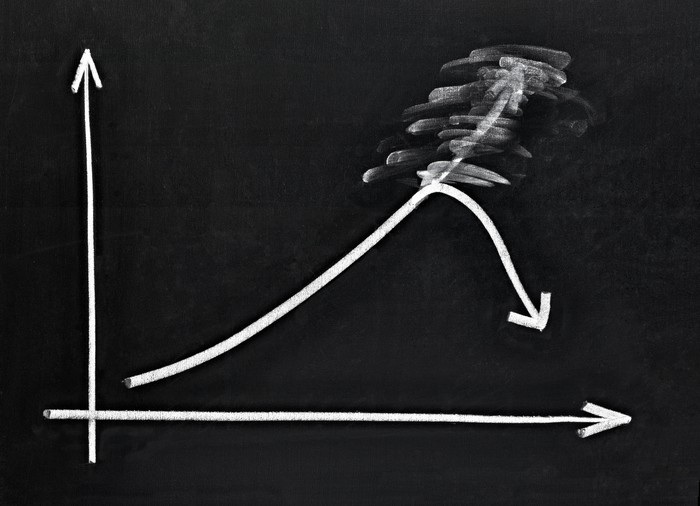What happened
Last month wasn't very good to shareholders of Mosaic Company (MOS +2.00%), Terra Nitrogen (NYSE: TNH), or CVR Partners LP (UAN 0.22%), which dropped 15.8%, 11.2%, and 21%, respectively. All are dependent on healthy selling prices for nitrogen fertilizer products -- and the multi-year slump in prices continued in the first three months of 2017. That alone hurt the first-quarter earnings of each company, which were reported in late April and early May.
Meanwhile, CVR Partners had a relatively uneventful month aside from an article that pointed out the deterioration of the company's performance, and urging investors to sell the stock.

Image source: Getty Images.
So what
Mosaic Company specializes in manufacturing monoammonium phosphate (MAP) and diammonium phosphate (DAP). Ammonium is comprised mainly of the element nitrogen. Therefore, the company's production costs and the selling prices it can realize for its combinatory nutrient products are affected by the strength of nitrogen fertilizer prices. Those were problematic in the first three months of the year.
North American sales in the phosphate segment (which includes MAP and DAP) cratered 22% compared to the year-ago period, although that was partially offset by a 19% bump in the slightly smaller international segment. Total segment sales slumped 8% in the comparison period, although sales volume actually increased 3% in that time. As you can guess, nitrogen prices didn't help.
There's some irony involved. On one hand, weak nitrogen prices allowed Mosaic Company to decrease its nitrogen costs 23% during the quarter, allowing for a beneficial impact for cost of goods sold. On the other hand, weak nitrogen prices are a sign that there's still too much supply in the market, which tanked North American production and revenue. Worse, unscheduled downtime at the company's ammonia production facility (recorded as a manufacturing cost) reversed the benefit from lower purchase prices for nitrogen inputs.
Terra Nitrogen didn't fare much better, which is hardly surprising considering it's more directly affected by weak nitrogen prices than Mosaic. To be fair, the nitrogen specialist managed to improve earnings and revenue during Q1 2017 compared to the year-ago period. Net income tallied up to $42.2 million on sales of $119 million, compared to $37.7 million and $108 million in Q1 2016.
However, the company only managed to hold the line by increasing production volumes of its two main products, ammonia and urea ammonium nitrate, 40% and 47%, respectively, in that period. That was offset by decreases in average selling prices of 23% and 24%, respectively, and a 5% increase in natural gas costs -- a key component of nitrogen fertilizer manufacturing. As a result, Terra Nitrogen issued one of its lowest distribution payments ever -- just $0.97 per share (although investors should remember it completely skipped this payout last year due to unscheduled downtime at a production facility).
And finally, shares of CVR Partners lost 21% of their value in May -- with nearly all of decline occurring after an article published detailing three signs that investors should consider selling the stock. The argument was that the continued weakness in nitrogen selling prices was likely to have prolonged consequences for the company. Already, shareholders have been asked to withstand an absence of distribution payouts, a deterioration of operating cash flow, risks from an outdated production process, and increased interest expense payments after the acquisition of Rentech Nitrogen Partners.
While that acquisition could pay dividends in a higher price environment, it has become a significant burden for the company due to the relatively large debt load CVR took on to make it. Interest expenses are on track to total $0.56 per share this year, which is $0.56 per share that CVR Partners doesn't have to give back to investors. Simply put, the acquisition that was supposed to unlock awesome growth is dragging the company down.
Now what
Investors who have stuck around this long have to be getting impatient with nitrogen fertilizer stocks, for which the beginning of the long-promised recovery is always a few quarters away. A glut of oversupply has not worked its way out of the system, and may take quite a bit longer to do so, thanks to a multitude of international factors. Long story short, nitrogen fertilizer stocks are in the down part of the cycle, but betting on a recovery is still risky.








